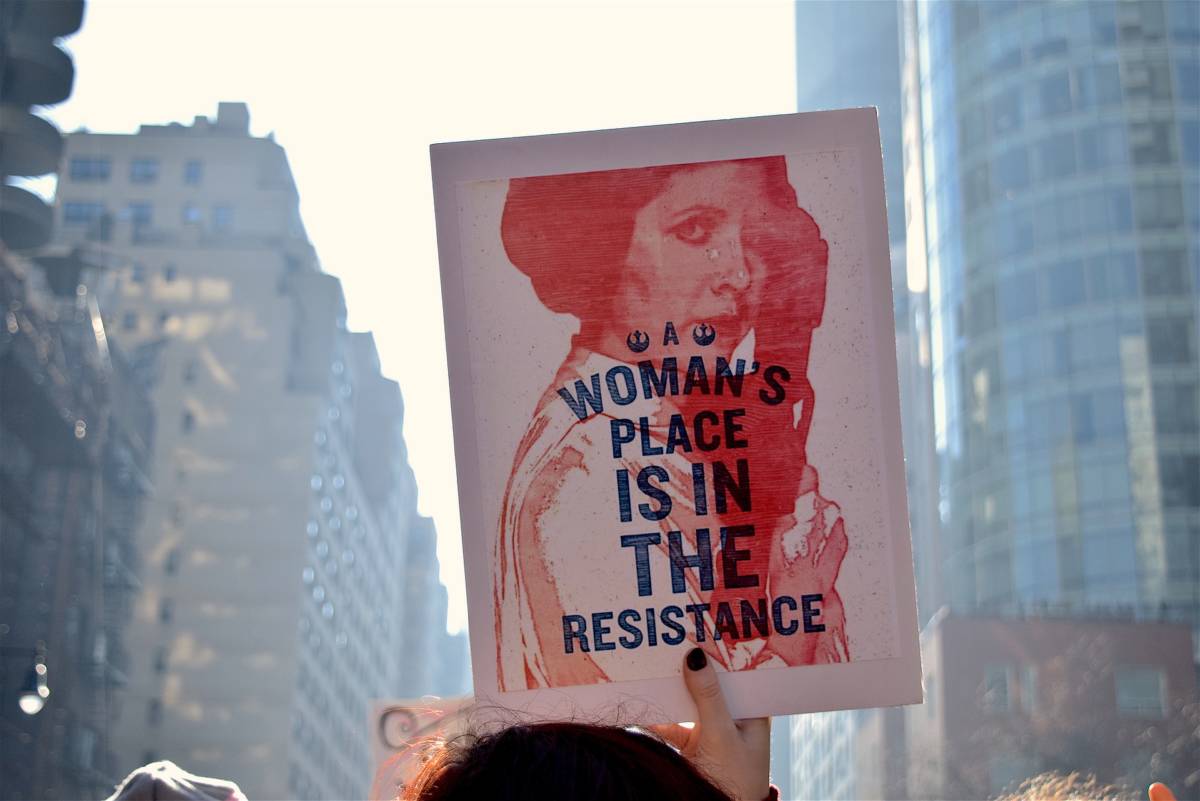 By Erika Larsen
By Erika Larsen
“Welcome to your first day; we will not go away!” Chants began even before the marching. At 1:30 p.m., 30 minutes before the official meeting time for the Women’s March on the Utah State Capitol, hundreds of people started filtering into City Creek Park at the base of Capitol Hill in Salt Lake City on Jan. 23. A buzz of anxious energy hung at shoulder level. Every person in the park had a deeply personal reason for marching. Some were fighting for bodily autonomy, others were advocating for improved stances on sexual assault, and many were supporting intersectional notions including racial justice and LGBTQIA+ equality.
As more women and allies packed into the park, a light snow began to fall on the crowd. Within minutes, the light snow turned to hail and finally transitioned into a steady and heavier snowfall. Despite the cold temperatures and the wet snow, spirits were still bright and the crowd maintained a hopeful atmosphere. It was impossible to deny the excitement at seeing thousands of people pouring into the small park.
At 2 p.m., it was approaching time to march. As the crowd waited for Salt Lake City police officers to shut down State Street and the bottom and top of Capitol Hill, the crowd started shifting about with eager energy.
This eager energy transformed into power and solidarity as we marched up to and ascended the Capitol steps and made our way into the rotunda for the rally. It evolved into radiating resilience as we listened to important intersectional women reaffirm our importance in the community. Women legislators and community activists reminded us about the influence we have and the responsibility we bear to use it to elevate one another, to fight for one another. In a state that has some of the objectively worst statistics for women — whether dealing with wage gaps, under-representation, or the prevalence of domestic violence and sexual assault — these women reminded us not only that we have work to do but that we can get the work done together.
Because so much of what affects a woman’s day-to-day life comes from the state level, we as march organizers wanted to capitalize on the most effective way to have our voices be heard here in Utah. What better way than to fill the capitol with thousands of women rallying loudly together on the first day of Utah’s 2017 legislative session? We were sending a message that we would show up, we would be heard, and we wouldn’t go away.
I received a lot of criticism not only for marching but also for helping to organize the march. I was confronted with constant questioning that often came from fellow women: “Why are you marching?” “Do you really believe women are in a terrible place in this country?” “Are you just mad Trump got elected?” I shook my head in response to all of these questions. My visceral response was to ignore these challenges as unproductive. But I couldn’t shake them. Why was I marching? I knew it was important to me, but could I articulate why?
As I carefully sifted through my thoughts, I realized that the reason I march is to continue the work that so many of my feminist sisters started over a century ago and have carried in the years before me — to continue a fight they cannot continue, only I can. Only women now can. Feminism is the reason I get to march. Feminism is the reason these other women get to openly criticize our marching and our feminism. Feminism is the reason women have the choice to define their lives and to choose their paths.
And I remember that it was women who did the work before me, not men. Women who, despite more criticism than I could ever imagine, fought to secure our right to vote, our right to own property, our right to go to college, our right to stand up for ourselves, and our right to strive to be whatever kind of women we want to be. These rights were won by women who were arrested and who starved themselves in jails on hunger strikes; women who were fired from their jobs for speaking up; women who were ridiculed for thinking “differently,” over-medicated for “hysteria,” and locked into insane asylums for daring to believe they could choose, daring to believe they could be equal. I have the ability to march now — and my critics have the ability to criticize me openly — in large part because of these brave women. These women were soldiers.
And these women were feminists.
If you are proud of women for fighting this battle for you, you are a feminist. If you believe that women should be treated with respect, understanding, and integrity, you are a feminist. If you believe that women should be able to have a seat at the table — at whatever table they want, whether the dining room table or the conference room table — you are a feminist.
“Feminism” is not a dirty word. It represents something fierce, protective, focused, beautiful, and passionate. It represents you, even if you don’t want to represent it.
So as I ascended to the top of Capitol Hill on this historic day in Salt Lake City — Jan. 23, 2017 — the snow still heavily falling, my toes numb, my lungs working harder than usual, I took a moment to look at the picture before me: Thousands of women standing on the Capitol steps, turned to face all their sisters still marching. I saw feminists living now, embodying the spirits of all of the women who paved this road for us: Alice Paul, Sojourner Truth, Ida B. Wells, Susan B. Anthony, Alice Stone Blackwell, Bell Hooks, Betty Friedan, Gloria Steinem, Coretta Scott King, Maya Angelou, and countless others. Women who started the work I will proudly continue. Women from all walks of life who understood the fundamental truth that I understand: I am a woman, and I am also a person, and I deserve to be treated with dignity, respect, and equality.
I am proud to carry this torch forward and to fiercely defend the rights these women fought so hard to get. This march, and all other sister marches around the country and world, reminded me of my power and my voice. But these marches were only the first step. We have to keep showing up and using our voices and our power, because we’ve got work to do.
Erika Larsen graduated from Dixie State University in 2011 with a bachelor’s degree in English.



